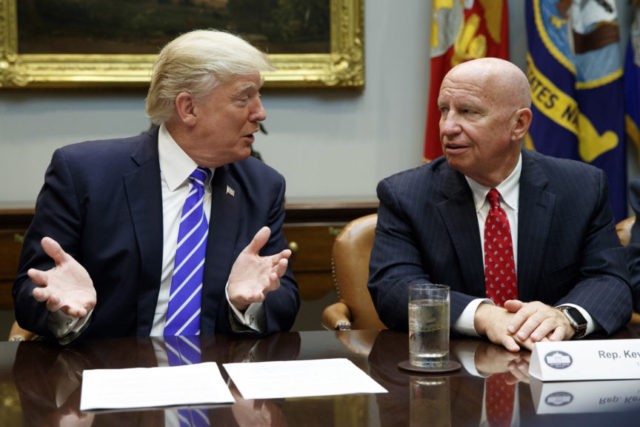The House GOP’s top leader on tax reform said Wednesday that changes to a popular tax break for retirement savings are still under consideration.
Kevin Brady, the Texas Republican who chairs the House Ways and Means Committee, appeared to contradict President Trump’s position that there would be “no change” to 401(k)s in the Republican tax proposal. Speaking at a breakfast with reporters hosted by the Christian Science Monitor, Brady would not rule out changes when asked whether Trump’s statement had killed the idea.
Trump, however, took credit Wednesday for “very quickly” putting the idea down with his tweet earlier in the week.
The apparent clash between Brady and Trump would appear to highlight disarray in the Republican Party even as it prepares to release the details of its tax overhaul on Monday.
When asked Wednesday whether changes to 401(k)s were still on the table, the president appeared to indicate that they were indeed still being discussed but that he had not waivered in his opposition.
“May it is and maybe we’ll use it as negotiating,” Trump said to a group of reporters. “But trust me, that’s one of the great things. You, know there are certain elements of deals you don’t want to negotiate with–401(k)s–and Kevin knows it. And I think Kevin Brady is fantastic but he knows how important 401(k)s are.”
Commerce Secretary Wilbur Ross in an interview with CNBC echoed the president’s hardline support for 401(k)s.
“The president does not want to interfere with people’s savings, period,” Ross said.
Capitol Hill Republicans have reportedly been considering lowering the cap on 401(k)s, which allow workers to defer taxes on savings until they are withdrawn. Under current law, workers can put up to $18,00 into 401(k) accounts. Republicans have reportedly considered lowering that amount to $2,400, requiring any amounts above that to be fully taxed in the year they are earned while promising not to tax them when they are withdrawn.
Critics say this would discourage savings, potentially weakening the long-term fiscal health of the government by increasing worker dependency on government programs to support the elderly. It also would not government revenue over the long term, since the savings taxed now would not be taxed later. At best, it simply moves the timing of the tax revenue into the present from the future.
But since it would generate more revenue in the near term, it would Republicans to appear to “pay for” revenue losses from lower corporate taxes.
Those hardest hit by the changes under consideration would be workers who expect their incomes to decline in their later years. A worker in the 25 percent tax bracket now, for example, but whose income will decline to the 10 percent bracket after retirement, would lose out by paying taxes on savings now rather than later in life.
What’s more, the plan puts more savings at risk of a change in government policy. While current law promises not to tax retirement gains that were taxed when earned, future changes to tax policy could undermine this. This concern is heightened by high levels of government debt, which might cause future Congresses to aggressively pursue new revenue. A large pot of retirement savings might invite a raid by a revenue strapped federal government a decade or two from now.
Trump’s position of preserving the current status of 401(k)s protects workers from that kind of double-dealing. The House leadership reform essentially promises to deliver a tax break decades from now in exchange for a tax hike today.

COMMENTS
Please let us know if you're having issues with commenting.